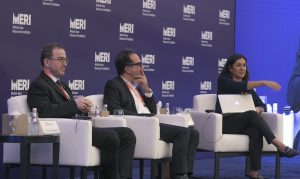Regional Actors in Iraq’s Neighbourhood: Time to Desecuritise Relations
- Elbrus Kutrashev, Russian Ambassador to Iraq
- Kayhan Barzegar, Center for Middle East Strategic Studies, Tehran, Iran
- Lahib Higel, International Crisis Group (Moderator)
In this panel (at MERI Forum 2022), the roles of regional and international actors, particularly Russia and Iran, in Iraq’s neighborhoods, were discussed, with emphasis on desecuritising relations across the borders (click here for video of the session in full). Iraq, its neighbours and other regional powers have long engaged in internal conflicts and/or wars. Meanwhile, the Middle East, as a whole, remains vulnerable to the impacts of ongoing rivalries between major world powers. Lahib Higel of International Crisis Group introduced the session and asked each speaker to articulate their respective country’s policies in the region and in Iraq. Higel turned to Ambassador Elbrus Kutrashev first, and asked about the recent summit that was convened in Tehran earlier in the year between Presidents Putin, Raisi and Erdogan, which came at the back of the existing tensions, especially in Syria and Ukraine.
Ambassador Kutrashev emphasised that the summit was focused mainly on Syria. It came in the framework of Astana Platform “to discuss how we can cooperate in order to improve the complicated Syrian situation… Itwas not a framework for making deals on Syria”. Kutrashev emphasized that Rojava and Damascus need to sit down and reach an agreement to cooperate and stabilize the country. He mentioned that Russia’s position is clear on Syria: they want to see “an independent and stable” country. Russia’s role in Syria is more of a mediator where it helps all sides to deescalate the situation and persuade Rojava officials and Syrian government to come closer together. He argued that the United States does not want “any settlement between Rojava and Damascus. They have their own agenda in this area which is mainly based on anti-Iranian principles or ideas”. Whereas Turkey’s “behavior towards northeast Syria is, at least, predictable.”
Turkey and Russia are “partners” who agree on many issues, while have their differences. Iran, however, is Russia’s “strategic partner since long ago…. We see no problem in its nuclear development. We don’t trust those who try to terrorize us by saying that Iran is trying to make an atomic bomb”. He reminded the audience that developing atomic bombs only requires an old technology “of the first half of 20th century. So, if a country wants to develop a military program, it simply does”. In his opinion, Iran had plenty of opportunities to produce a nuclear bomb but never did, therefore, does not believe Iran has bad intentions in this issue. “But we demand that dialogue should continue and things which concern western states should be solved”.

Kutrashev emphasised that dialogue is the best method to solve conflicts and improve relations with the regional countries. Turkey can also play as a mediator to resolve the conflicts between the Russia and Ukraine. He said that “there’s always chance for dialogue, and this dialogue between three leaders of Russia, Iran, and Turkey, is effective in terms of finding solutions to many regional issues.”
Kayhan Barzegar of the Center for Middle East Strategic Studies, characterized his country’s relations with its Middle East neighbours, including the UAE, Bahrain and Iraq as “good relations” but was not upbeat about relations with Saudi Arabia. He believed that the Saudis are “confused” and “need time” as they are not ready for negotiation with Iran because “they are waiting to see what will happen in America”. The Saudis “wanted to talk with Iran on settling the Yemeni issues, the Iranians wanted to somehow put it in a broader sense. Iranians agreed to a ceasefire in Yemen, and cooperated, but the Saudis I think still need some time to initiate meaningful negotiations with Iran”.
Iraq, according to Barzegar, is close ally of Iran and the two countries “have a lot of commonalities, that goes to the historical, geographical, and cultural determinations”. Iran and Iraq were two geopolitical rivals in the past but since the regime change in 2003, they have become allies and developed strong cultural and trade connectivity. He admitted that Iran’s involvement in Iraq is sometimes perceived as expansionism, whereas from Iran’s point of view, they are protecting their country from external threats at a time when they “feel a sense of strategic loneliness”. Iran considers the US and Israel as the two main countries that pose major “threats to Iranian national security”. “The security of Iraq matters for Iran, because they are linked, but the problem is the legacy of the US involvement in the regional politics, the fiasco in Afghanistan, in Iraq, dealing with the Kurdish people… the US supremacy has brought nothing but war, violence, and regime change”.

In terms of desecuritising relations in the Middle East, Kutrashev stated that there is an international and regional consensus that Iraq should remain stable. He believes that Iraq has all the potentials not only to be a strong state but rather a regional power, if its human and natural resources are used in the benefit of the country and its stability. Barzegar agreed that Iraq should be self-reliant to develop and strengthen its position internationally and regionally. Instead of ‘Iraq for all’ (the conference’s title), he thinks that Iraq should be for itself, just as other countries like Iran, Turkey and Saudi Arabia are. This applies to all aspects of relations, including “trade, control, relations, connectivity and geography”. It is important to have good unneighborly relations that can help solve problems. “Too much conflict and involvement of foreign actors in the regional politics has divided the regional countries and their domestic politics. I think the region should be left alone to think of themselves, and Iraq is one of them”.
Concerning the question on the Iranian ballistic missile attacks on the Kurdistan Region, Barzegar argued that Iran works on the “evidence that Israeli agents work in Erbil to destabilize Iran and the region”. He stressed that Iran cannot tolerate Israeli bases in Iraq and believes that “there is an Israeli hand in intensifying and operationalizing the areas inside Iran.”
Concerning Iranian nuclear program and the current protests in Iran, Barzegar, argued that Iran will not recommence the nuclear talks as long as there are unrests inside the country, because he believes that “a divided Iran will never talk, only a strong Iran will talk. A divided, politically fractured Iran will, as history shows, never wanted to go through negotiations because it feels it will lose”. According to Barzegar, it is a wrong assumption to think that Iran can be weakened and exploited since there are civil unrests in the country. Iran cannot be easily toppled through internal unrest because Iranians have a long history of strong governance and have strong state institutions. He also said that stability of Iran is important for the stability of the region and is in the benefit of the region.
Barezgar highlighted that the Iranians want to resolve their problem with the US and reach a final agreement on the nuclear deal. He believes that the US has shown bad intentions in dealing with the nuclear issue, therefore, Iran has decided to go in its own way, trying to empower itself from inside, trying to connect its economy with China and Russia.
Regarding the oil and gas policy in the Middle East after the Ukraine crisis, Barzegar emphasized that Iran and Russia are not competitors anymore, but cooperate in the market. He believes that in the “context of Iran-Iraq-Turkey-Russia, connectivity of oil and gas by pipelines and the geopolitics of pipelines, this project will benefit all.” There is a possibility that these regional countries will cooperate to export oil and gas to Europe, according to Barezgar. He argued that the world is no longer just the west because other countries have found a place to represent themselves, de-westernize international relations and build unities among themselves. Examples are China, Iran, Russia, Turkey, Saudi Arabia and India. Iraq can also be a part of this alliance due its geopolitics which is at the core of it.
On the question of regional supply chains connectivity through land and sea, Barezgar pointed out that there is a great potential and coordination among China, Iran, Eurasia, and Iraq. It is crucial for economic prosperity of these countries to coordinate and exchange commodities. He named one example of Iran-Iraq economic relations that has improved in the last two decades. He said that during “Saddam Hussein-Baathist regime, Iran-Iraq economic exchanges were zero, now … they are about 15 billion dollars.”

